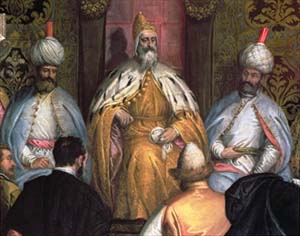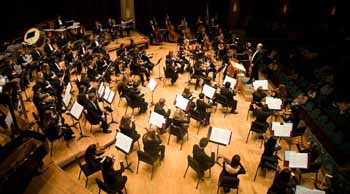 |
Organic Society
What Is the Res Publica?
Plinio Corrêa de Oliveira
The current definition of a State is the political organization of a Nation. A Nation is a society that constitutes a government with a determined form, exercised by organs over what is called the public cause, public interest or, literally, the ‘public thing,’ the res publica of a country.
Public thing is the literal translation of res publica, since res translates as thing. What does it mean?

The Doge representing the Venice Republic receives the ambassador of Persia |
In a country we make a distinction between public and private interests. The sphere of private interest encompasses everything regarding the private life of an individual. So, everything related to the honor, dignity, formation and natural rights of a man should be looked after and defended by the private person. The public interests concern both the goods and advantages of all the inhabitants of a country; it should be defended and promoted by the State.
Before the French Revolution, the expression res publica was used to designate things of public interest in any form of government. Addressing a King, a speaker could say: “Sire, I am reporting to you that last year the res publica of your Kingdom progressed favorably.” This would mean that the works for the public welfare had gone forward.
Only after the French Revolution did the expression res publica, or republic, take on the specific meaning of a non-monarchical form of government.
In short, an individual takes care of things regarding his own private interest, and the State takes care of whatever is in the interest of the whole country. This is the basic difference between the public and the private ‘things.’
The social interest lies between the public and private
There are areas, however, where even though the general interest is involved, the State should only offer its assistance and not actively enter. For example, there is a general social and cultural interest in promoting music in a country. Normally speaking, the people who are enthusiasts of music should form their own organization to promote it. This organization should find donors among the population to sponsor its programs, encourage its youth to study good music, give scholarships to those who have special talents in music, sponsor music performances and concerts, etc.

The promotion of music is a social-cultural activity that should rely on its own means |
Sometimes it happens, though, that such an organization lacks financial means to continue its work. Then it is natural for the State to offer monetary assistance to the organization until it can stand on its own feet again. It is just a temporary help until that organization can operate on its own. It is understandable. It is not the mission of the State to promote music. It is a private interest of a group of people, but in special cases it may request the occasional help of the State.
Therefore, between the public sphere that concerns the State and the private that concerns the individual, we find something else, which is neither exclusively public nor private: It is what characterizes general society, the formation of a public opinion, a special mentality, that is, the ensemble of the thinking of that country, its literary and artistic development, its cultural patrimony formed by the great men Divine Providence gave that country. Through this organic process of improvement, the soul of the Nation is shaped.
We have, therefore, three spheres: the political, social and private.
State intervention and influence of the evil
European politicians, in general, are very concerned about the political sphere, that is, the interests of the State, but do not have a strong penchant to intervene in private interests. They leave this to the initiative of each individual. They do not have the idea that the State should intervene in everything. Normally, there is no official school of painting promoted by the State, which establishes penalties for anyone who does not follow its standards. These cultural spheres of art, music, cooking, and so on, follow their own ways without too much interference from the State.
Unfortunately, the same does not happen in our three Americas, mainly in South America, where politicians tend to structure an all-powerful State that aims to control the entire life of the individual.
The social and cultural life should develop spontaneously, in accordance with the spirit of each country as a result of the interaction of the people, with the better, greater and more capable ones predominating over the others. If this does not occur organically, the country goes in the wrong direction, favoring the influence of the worse persons over the better ones.
In parallel, let me make a moral observation on something curious and mysterious that must be taken into consideration when we deal with the social phenomena. It is the influence that the evil generally exercises over the good. When a group of friends gathers together, it is usually the worse ones who have more influence. The good have to exert themselves and fight to acquire some influence, while those who are bad achieve it simply by their presence. That group will become worse insofar as the good allow the evil to dominate. This fight occurs in each family, school, club or group of friends that gathers in a restaurant. It is a battle in miniature of the fight between the Revolution and the Counter-Revolution. One day I would like to analyze this in more detail.

Posted August 13, 2010

  | | Prof. Plinio |
Organic Society was a theme dear to the late Prof. Plinio Corrêa de Oliveira. He addressed this topic on countless occasions during his life - at times in lectures for the formation of his disciples, at times in meetings with friends who gathered to study the social aspects and history of Christendom, at times just in passing.
Atila S. Guimarães selected excerpts of these lectures and conversations from the trancripts of tapes and his own personal notes. He translated and adapted them into articles for the TIA website. In these texts fidelity to the original ideas and words is kept as much as possible.

Related Topics of Interest
 A Participative Society A Participative Society
 How Intermediary Societies Participate in the State Power How Intermediary Societies Participate in the State Power
 The Perfect Societies: Church & State The Perfect Societies: Church & State
 The Organic Formation of a Region The Organic Formation of a Region
 All Classes Should Have Elites All Classes Should Have Elites
 The Immaculate Character of the Catholic Church The Immaculate Character of the Catholic Church
 Church - State Relations Church - State Relations

Related Works of Interest
|
|
Organic Society | Social-Political | Home | Books | CDs | Search | Contact Us | Donate

© 2002-
Tradition in Action, Inc. All Rights Reserved
|
 |
|